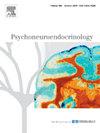配偶丧亲会增加促炎细胞因子的产生,从而导致急性心理压力
IF 3.4
2区 医学
Q2 ENDOCRINOLOGY & METABOLISM
引用次数: 0
摘要
早期丧偶的特点是慢性压力,并与较高的抑郁发生率和心血管相关发病率和死亡率相关。外周炎症参与了重度抑郁症和动脉粥样硬化血栓形成的发病机制,可能是寡妇(er)患这两种健康状况风险升高的共同机制。慢性心理应激使外周应激反应中促炎细胞因子的释放变得敏感。本研究考察了最近的配偶丧亲是否会增强对急性心理压力源的炎症反应。最近丧偶的老年人(n = 143)和未丧偶的对照组(n = 69)参加了一项准实验研究,在此期间,他们接受了Trier社会压力测试,通过静脉导管提供了多种血液样本(压力前,45 分钟后压力,120 分钟后压力),并完成了自我报告问卷。检测血液样本血清白细胞介素-6水平。采用混合线性模型对假设进行检验。控制混杂变量后,时间× 丧亲状态对IL-6有显著影响。与未丧偶的成年人相比,丧偶者每小时IL-6的增加幅度更大。研究结果表明,寡妇(er)的炎症应激反应增强,这可能导致与早期丧偶相关的精神和身体健康风险。本文章由计算机程序翻译,如有差异,请以英文原文为准。
Spousal bereavement enhances proinflammatory cytokine production to acute, psychological stress
Early widowhood is characterized by chronic stress and is associated with a higher risk of incident depression and cardiovascular-related morbidity and mortality. Peripheral inflammation is involved in the pathogenesis of major depressive disorder and atherothrombosis and may represent a common mechanism underlying widow(er)’s elevated risk for both health conditions. Chronic psychological stress sensitizes the release of proinflammatory cytokines during the peripheral stress response. The present study examined whether recent spousal bereavement enhances the inflammatory response to an acute, psychological stressor. Recently widowed older adults (n = 143) and non-widowed controls (n = 69) participated in a quasi-experimental study, during which they underwent the Trier Social Stress Test, provided multiple blood samples through an intravenous catheter (before stressor, 45 min post-stressor, 120 min post-stressor), and completed self-report questionnaires. Blood samples were assayed for serum Interleukin (IL)-6 levels. Mixed linear modeling was used to test hypotheses. There was a significant time × bereavement status effect on IL-6 after controlling for confounding variables. Widow(er)s showed a steeper increase in IL-6 per hour compared to non-bereaved adults. Findings suggest that the inflammatory stress response is heightened in widow(er)s, which may contribute to the mental and physical health risks associated with early widowhood.
求助全文
通过发布文献求助,成功后即可免费获取论文全文。
去求助
来源期刊

Psychoneuroendocrinology
医学-精神病学
CiteScore
7.40
自引率
8.10%
发文量
268
审稿时长
66 days
期刊介绍:
Psychoneuroendocrinology publishes papers dealing with the interrelated disciplines of psychology, neurobiology, endocrinology, immunology, neurology, and psychiatry, with an emphasis on multidisciplinary studies aiming at integrating these disciplines in terms of either basic research or clinical implications. One of the main goals is to understand how a variety of psychobiological factors interact in the expression of the stress response as it relates to the development and/or maintenance of neuropsychiatric illnesses.
 求助内容:
求助内容: 应助结果提醒方式:
应助结果提醒方式:


